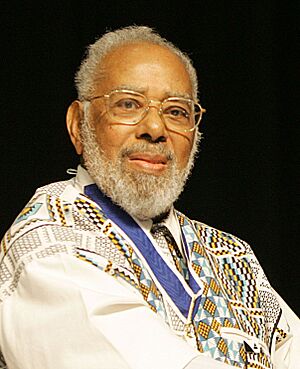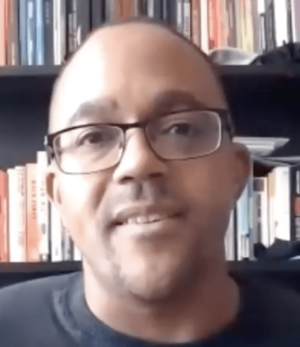Black studies facts for kids
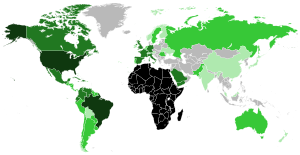
Black studies, also known as Africana studies, is an exciting field of study that explores the history, culture, and politics of people from Africa and the African diaspora. The African diaspora refers to communities of African people living all over the world, outside of Africa, often due to historical events like the slave trade.
This field brings together many different subjects, like history, literature, politics, and religion. It also includes ideas from sociology (the study of society), anthropology (the study of human cultures), and psychology (the study of the mind). Scholars in Black studies look at the experiences of people like African Americans, Black Canadians, Afro-Caribbean people, and many others.
Serious academic work to understand African-American history began in the late 1800s with pioneers like W. E. B. Du Bois and Carter G. Woodson.
In the United States, Black studies programs and departments first appeared in the 1960s and 1970s. This happened because students and teachers worked together and protested at many universities. A big moment was a five-month strike at San Francisco State University in 1968-1969. This led to the first Black studies program and department being created there. Students felt that traditional university subjects didn't properly cover their cultures and interests, so they demanded these new programs.
Black studies programs also started in other parts of the world, including the United Kingdom, the Caribbean, Brazil, Canada, Colombia, Ecuador, and Venezuela.
Contents
- Different Names for the Field
- History of Black Studies
- Research Methods in Black Studies
- African Self-Consciousness
- Africana Womanism
- Afrocentricity
- Black Male Studies
- Blues Culture
- Double Consciousness
- Four Basic Tasks of the Black Studies Scholar
- Kawaida Theory
- Miseducation of the Negro
- Nigrescence
- Optimal Worldview of Psychology
- Paradigm of Unity
- Shared Authority
- Social Legitimacy
- Two Cradle Theory
- Ujimaa
- Challenges for Black Studies
- Universities with Black Studies Programs
- Universities with Advanced (Ph.D.) Programs in Black Studies
- Important Scholars in Black Studies
- See also
Different Names for the Field
This academic field has many different names. Some common ones include Africana Studies, African and African Diaspora Studies, African American Studies, and Black World Studies.
These different names often depend on a few things:
- Local Focus: Some programs focus mainly on the experiences of African Americans in the United States.
- Diaspora Focus: Others include all people of African descent in the Americas (North, South, and the Caribbean).
- Global Focus: A broader view includes African communities all over the world, as well as the continent of Africa itself.
History of Black Studies
In the Americas
North America
Canada
In 1991, the James Robinson Johnston national chair for Black Canadian Studies was created at Dalhousie University. Its goal was to help Black studies grow in Canada.
Mexico
Gonzalo Aguirre Beltrán helped start Afro-Mexican studies with his book The black population in Mexico in 1946.
United States
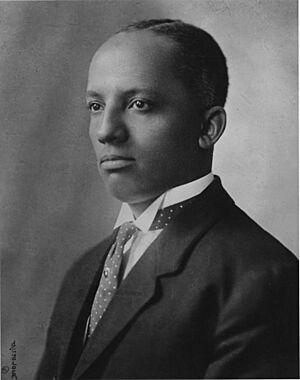
A main goal of Black studies is to help students learn more about the human experience worldwide. It does this by focusing on the Black Experience, which was often ignored or misunderstood in schools. It also aims to introduce an "Afro-centric" perspective, meaning looking at things from the viewpoint of African cultures.
According to Robert Harris Jr., a professor at Cornell University, Black studies developed in stages. Early on, organizations studied African cultures. Later, the focus shifted to African Americans. Then, many new academic programs were created.
The 1960s were a time of big social change in the United States. Many movements, like the Civil Rights Movement, challenged the existing social order.
Students at the University of California, Berkeley (UC Berkeley) were very involved in these changes. In 1964, a student named Jack Weinberg was arrested for protesting. About 3,000 students surrounded the police car, using it as a platform to speak about their right to protest. This event was one of many that led to the creation of Black studies.
Later, students at UC Berkeley protested rules that limited political clubs. They formed a "freedom of speech movement." Leaders from the Civil Rights Movement, like Stokely Carmichael and James Bevel, spoke to students about their goals.
These events pushed universities to address racial issues. In 1966, a survey showed that only about 1% of UC Berkeley students were "American Negro." In 1968, the university started a program to help more minority students enroll and get financial aid.
As more minority students joined, they wanted more control over movements that affected them. In April 1968, the Afro-American Student Union (AASU) proposed a "Black Studies" department. They demanded a program "of and for black people" that would educate them "realistically." Nathan Hare, a sociology professor, helped create a plan for this. On January 13, 1969, UC Berkeley started a Black studies program.
Similar student actions led to Black studies departments at other universities, like the University of California, Santa Barbara and Yale University. At Syracuse University, students were inspired by civil rights and the success of Ernie Davis, the first African American to win the Heisman Trophy. In 1969, they demanded Black studies, which became a degree-granting department in 1979.
The term "Africana studies" came later, focusing on a global view of African history and culture. It aimed to make Black studies a more established academic field. Scholars like W. E. B. Du Bois and Carter G. Woodson influenced this idea.
Journals like Studia Africana and the International Journal of Africana Studies help share research in this field. Africana philosophy, which explores philosophical ideas from African perspectives, is also part of Africana studies.
Some scholars, like Molefi Kete Asante, suggested that Black studies should be called "Africology." This name emphasizes a unique "Afrocentric" way of studying African people, focusing on their cultures and experiences from their own point of view. This helps make the field stronger and more relevant.
Caribbean
Scholars from the United States and United Kingdom helped develop Black studies in English-speaking Caribbean countries. At the University of the West Indies, scholars like Elsa Goveia contributed greatly.
Cuba
In the early 1900s, Fernando Ortiz Fernández started the field of Afro-Cuban studies. The Society for Afro-Cuban Studies was founded in 1937, and it publishes an academic journal.
Dominican Republic
Los Negros Y La Esclavitud En Santo Domingo (1967) by Carlos Larrazábal Blanco is an important book in Afro-Dominican studies.
Haiti
Figures like Jean Price-Mars were important in publishing Les Griots, a key journal for Afro-Haitian studies. René Piquion is another influential scholar in this area.
Puerto Rico
As of 2019, the University of Puerto Rico does not offer a degree in Afro-Puerto Rican studies. However, scholars like Isar Godreau have written important works in this field.
Central America
Costa Rica
Costa Rica has laws to help include Afro-Costa Ricans more fully, including creating a Committee for Afro-Costa Rican Studies.
Guatemala
Santiago de Guatemala, 1541-1773 by Christopher H. Lutz is a foundational text for Afro-Guatemalan studies.
Honduras
Due to historical challenges, formal Afro-Honduran studies have been limited, and Afro-Hondurans have often been left out of academic publications about Honduras.
Panama
In March 1980, the Afro-Panamanian Studies Center, with the Panamanian government, hosted a major conference on Black Culture in the Americas.
South America
Argentina
Since the 1980s, Afro-Argentine studies has been growing again.
Brazil
In 1980, Abdias Nascimento presented his ideas on Kilombismo, which looked at how African people in the Americas organized themselves socially, economically, and politically. He then helped start Africana studies in Brazil in 1981, creating the Afro-Brazilian Studies and Research Institute (IPEAFRO).
Chile
Afro-Chilean studies have become more organized and focused on Afro-Chileans and their cultural heritage since the 2000s.
Colombia
Scholars like Rogerio Velásquez helped start Afro-Colombian studies in the 1940s and 1950s. After the Colombian Constitution of 1991, new laws helped develop national educational content about Afro-Colombians and Africa. Programs in Afro-Colombian studies now exist at universities like the National University of Colombia and the Pontifical Xavierian University.
Ecuador
Afro-Ecuadorians started the Center of Afro-Ecuadorian Studies in the late 1970s to explore their identity and history. Although it closed, later organizations led to programs like Afro-Ecuadorian Etnoeducación and a master's degree in Afro-Andean Studies.
Paraguay
In 1971, Carvalho Neto wrote Afro-Paraguayan studies.
Peru
While Afro-Peruvian studies are still developing in Peru, there are growing efforts to organize this field. For example, LUNDU organized an international conference in 2009. A student group focused on Afro-Peruvian studies was also created in Lima.
Uruguay
Since 1996, there has been more research in Afro-Uruguayan studies, partly due to a global increase in focus on Afro-Latin American studies.
Venezuela
The curriculum for Afro-Venezuelan studies was created at Universidad Politécnica Territorial de Barlovento Argelia Laya (UPTBAL) in Higuerote. Courses on Afro-Epistemology and African Culture began in 2006.
Europe
United Kingdom
Black studies in the United Kingdom have been revitalized by ideas from the United States. Kehinde Andrews has been very important in this, helping to create the Black Studies Association in the UK and a Black studies course at Birmingham City University. He continues to work for the growth of Black studies in the UK.
Research Methods in Black Studies
Black studies uses special ways to research and understand the experiences of African people. Here are a few:
African Self-Consciousness
Kobi K. K. Kambon developed this method to look at how the African mind works and changes.
Africana Womanism
Delores P. Aldridge created this method, which looks at things from the viewpoint of black women. It emphasizes that the family unit is often more important than the individual.
Afrocentricity
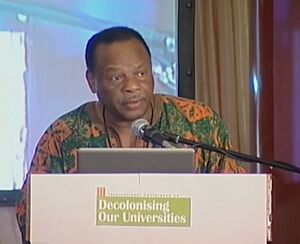
Afrocentricity is a way of thinking and researching that puts the experiences of people from Africa and the African diaspora at the center. It helps understand their history, culture, and society from their own perspective. Molefi Kete Asante developed this method in 1980, inspired by many other thinkers like W. E. B. Du Bois and Malcolm X.
Black Male Studies
Black Male Studies focuses on the experiences of Black men and boys. It explores Black manhood and masculinity using ideas from history, philosophy, and sociology. This field aims to challenge old ideas about Black men and boys and understand them from their own point of view.
Blues Culture
James B. Stewart developed this method to examine the unique qualities of Africana culture, using ideas from different subjects like economics and history.
Double Consciousness
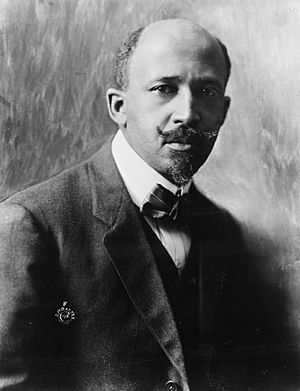
W. E. B. Du Bois developed the idea of Double Consciousness. This helps us understand how African people often live in two worlds at once – their own culture and the wider society that might see them differently. They learn to navigate these different views.
Four Basic Tasks of the Black Studies Scholar
James Turner created this method, which looks at problems affecting African people. It involves four main goals: defending, sharing, creating, and keeping new knowledge.
Kawaida Theory
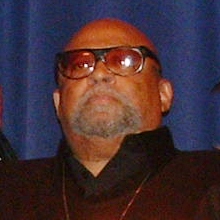
Maulana Karenga developed Kawaida Theory, inspired by the Nguzo Saba (Seven Principles of Kwanzaa). This method uses seven factors (like history, religion, and social organization) to understand the African experience from a Pan-African perspective (meaning a focus on the unity of all African people).
Miseducation of the Negro
Carter G. Woodson developed this idea, which looks at how African people's history and culture have been ignored or misrepresented in education. He argued that this "miseducation" causes African people to lose touch with their own heritage.
Nigrescence
William E. Cross Jr. developed Nigrescence, a psychological framework that looks at African culture and how Black people develop their racial identity over five steps.
Optimal Worldview of Psychology
Linda Meyers developed this method to study the African mind through a cultural lens. It highlights the difference between an African mind that has adopted other cultures' views and one that stays true to its Africana identity.
Paradigm of Unity
Abdul Alkalimat developed this method, which focuses on relationships between social classes, using ideas from Marxism, and also considers gender and Afrocentricity.
Michael Frisch developed this method to study orature (oral traditions). It respects the experiences of African individuals, helping to gather information that might not be found in written records.
Social Legitimacy
Winston Van Horn developed this three-step method to analyze the political and social experiences of African people.
Two Cradle Theory
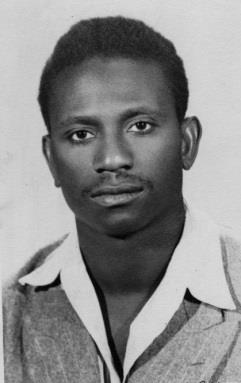
Cheikh Anta Diop used ideas from anthropology, history, and sociology to create the Two Cradle Theory. This method compares African and European cultures, looking at their differences.
Ujimaa
James L. Conyers, Jr. developed Ujimaa, also inspired by the Nguzo Saba. This method uses philosophy, sociology, and history to analyze Pan-African ideas and focuses on social responsibility and working together as a community.
Challenges for Black Studies
Black studies programs sometimes face challenges, such as not having enough money. This can make it hard for departments to buy materials or hire enough staff. Sometimes, professors from other subjects teach Black studies, even if they aren't experts in it. These money issues can make it difficult for Black studies programs to grow and promote themselves.
Racism has also been a challenge. Many Black studies programs were created because Black students demanded them. Students often wanted more Black students to be enrolled and to have financial help. They also wanted Black studies to be taught by people who truly understood the Black experience. On many campuses, Black studies leaders don't have full control over their departments, which can make things unstable for students and the program.
Over the past thirty years, there has been a decrease in the number of scholars specializing in Black studies.
Universities with Black Studies Programs
Brazil
- Pontifical Catholic University of São Paulo
Canada
- Brock University
- Concordia University
- Dalhousie University
- Queen's University
- York University
Caribbean
- University of the Virgin Islands
- University of the West Indies
Colombia
- National University of Colombia
- Pontifical Xavierian University
- University of Cauca
Ecuador
- Simón Bolívar Andean University
United Kingdom
- Birmingham City University
United States
- American University
- Amherst College
- Baruch College
- Brandeis University
- Brown University
- California State University, Dominguez Hills
- California State University, Fullerton
- California State University, Northridge
- Carleton College
- Cleveland State University
- College of William and Mary
- Columbia University
- Dartmouth College
- Davidson College
- Dominican University
- Duke University
- Eastern Kentucky University
- Eastern Michigan University
- Emory University
- Fordham University
- Georgetown University
- Georgia State University
- Guilford College
- Hunter College
- Queens College
- Indiana University
- Kent State University
- Oberlin College
- Ohio State University
- Loyola Marymount University
- Luther College
- Middle Tennessee State University
- Mount Holyoke College
- Nassau Community College
- Pennsylvania State University
- Portland State University
- Princeton University
- Purdue University
- San Jose State University
- Syracuse University
- Temple University
- The City College of New York
- The College of New Jersey
- Towson University
- Tufts University
- University at Albany
- University of Arizona
- University of Arkansas
- University at Buffalo
- University of California, Berkeley
- University of California, Davis
- University of California, Irvine
- University of California, Los Angeles
- University of California, San Diego
- University of California, Santa Barbara
- University of Florida
- University of Houston
- University of Kansas
- University of Louisville
- University of Massachusetts, Amherst
- University of Michigan
- University of Montana
- University of Nebraska at Omaha
- University of North Carolina at Chapel Hill
- University of North Carolina at Charlotte
- University of North Carolina at Greensboro
- University of North Texas
- University of Oklahoma
- University of Oregon
- University of Pennsylvania
- University of Puget Sound
- University of Rochester
- University of South Carolina
- University of Texas at Arlington
- University of Texas at Austin
- University of Virginia
- University of Wisconsin
- Valdosta State University
- Vassar College
- Virginia Commonwealth University
- Washington University in St. Louis
- Western Illinois University
- Wesleyan University
- Wright State University
- Yale University
Venezuela
- Universidad Politécnica Territorial de Barlovento Argelia Laya
Universities with Advanced (Ph.D.) Programs in Black Studies
United Kingdom
United States
- Brown University
- Columbia University
- Cornell University
- Harvard University
- Indiana University
- Michigan State University
- Northwestern University
- Ohio State University
- Pennsylvania State University
- Temple University
- University of California, Berkeley
- University of Louisville
- University of Massachusetts, Amherst
- University of Pennsylvania
- University of Texas at Austin
- University of Wisconsin–Milwaukee
- Yale University
Important Scholars in Black Studies
Africa
- Micere Mugo
Brazil
- Abdias Nascimento
- Beatriz Nascimento
- Lélia Gonzalez
Caribbean
- Carole Boyce Davies
- Horace Campbell
- Oliver Cromwell Cox
- Elsa Goveia
- C.L.R. James
- Walter Rodney
- Kwame Ture
- Sylvia Wynter
United Kingdom
- Kehinde Andrews
- Kwame Anthony Appiah
- Hazel Carby
- Paul Gilroy
United States
- Shawn Alexander
- Molefi Kete Asante
- M.K. Asante Jr.
- Houston A. Baker Jr.
- Bill Cole
- Patricia Hill Collins
- Edward W. Crosby
- Allison Davis
- Angela Y. Davis
- St. Clair Drake
- W. E. B. Du Bois (1868–1963)
- Michael Eric Dyson
- Gerald Early
- John Hope Franklin
- E. Franklin Frazier
- Henry Louis Gates Jr. (born 1950)
- Farah Griffin
- Vincent Harding
- Nathan Hare
- Melissa Harris-Perry
- Saidiya Hartman
- Melville Herskovits (1895–1963)
- bell hooks
- Charles S. Johnson
- Maulana Karenga
- Robin D.G. Kelley
- Glenn C. Loury
- Manning Marable
- Janis Mayes
- Fred Moten
- Mark Anthony Neal
- Adolph Reed
- Cedric Robinson
- Tricia Rose
- Milton Sernett
- Christina Sharpe
- Tracy Denean Sharpley-Whiting
- Renate Simson
- Geneva Smitherman
- Robert B. Stepto
- Conrad Tillard (born 1964)
- Akinyele Umoja
- Cornel West (born 1953)
- William Julius Wilson
- Carter G. Woodson
- Cynthia A. Young
See also
- Critical race theory


